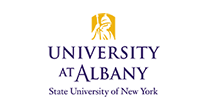News
April 6, 2022UAlbany, FIU Researchers Team Up to Launch $1.5 Million Virtual Cybersecurity Institute
An interdisciplinary group of University at Albany researchers are teaming up with peers at Florida International University to co-lead a new $1.5 million virtual institute that will help train the next generation of cybersecurity professionals for future military and civilian leadership positions.
The Virtual Institute of Cyber Operation and Research (VICOR) aims to advance a U.S. Department of Defense (DoD) VICEROY initiative to establish cyber institutes through higher education partners across the country. It is supported by the Griffiss Institute, a nonprofit talent and technology accelerator for DoD and an international network of academic, government and industry partners.
Funding for the institute will be used over the next two years to equip students with applied cyber operational skills through hands-on learning and research opportunities. It will also provide scholarships for 60 students selected for the program.
The institute is set to officially launch in June 2022.
“The United States needs a series of robust STEM programs to prepare today’s students for tomorrow’s cyber jobs,” said Heather Hage, president and CEO of the Griffiss Institute. “The Griffiss Institute is extraordinarily proud to bring VICEROY to life in partnership with the Office of the Undersecretary of Defense and the outstanding academic institutions selected to lead this critical initiative.”
“We are very excited to be selected for this award and have an opportunity to continue our contributions to the cyber defense of the U.S. through creating the next generation of cybersecurity experts,” said Unal Tatar, the project’s lead principal investigator and an assistant professor at UAlbany’s College of Emergency Preparedness, Homeland Security and Cybersecurity (CEHC). “This award is a remarkable indicator of UAlbany’s excellence in cybersecurity research and education.”
VICOR forms a new alliance between UAlbany and FIU, both Carnegie-classified R1 institutions with well-established cybersecurity programs.
FIU is a designated Minority Serving Institution, while UAlbany has stood out for its equitable enrollment of Black and Latino students. Most notably, UAlbany has been recognized by the Education Trust as a leader in advancing racial equity among the nation’s most selective public higher education institutions and is regularly ranked as a top institution in advancing social mobility.
Through VICOR, project leaders will recruit a diverse group of students at each institution. This will include ROTC cadets and veteran undergraduate students who have an interest in a wide variety of topics such as cyber defense techniques, digital forensics, security of the Internet of Things, artificial intelligence and data analytics for cybersecurity, electromagnetic spectrum operations, and strategic cybersecurity.
To supplement coursework, the institute will organize an annual undergraduate research conference, career fairs and cybersecurity seminars. It will also offer networking and mentorship opportunities with industry partners and access to state-of-the-art labs inside UAlbany’s new $180 million ETEC building.
The approach of the institute is to provide a unique experiential learning environment that is tailored to match the workforce demands of the DoD, Armed Services, and Defense Industrial Base partners.
“We are extremely pleased in achieving this award and recognition, as it enhances FIU’s leadership and commitment to cybersecurity research and education toward the development of a highly skilled cybersecurity workforce embracing the opportunities offered through the virtual institute’s capacity and alliance with UAlbany,” said Alexander Perez-Pons, principal investigator and an associate professor at FIU’s Department of Electrical & Computer Engineering and a member of the Cybersecurity@FIU program.
Tatar is joined at the institute by UAlbany faculty at CEHC and the School of Business. Co-principal investigators include Sanjay Goel, professor at the School of Business, Benjamin Yankson, assistant professor at CEHC, and Kemal Akkaya of FIU.


























